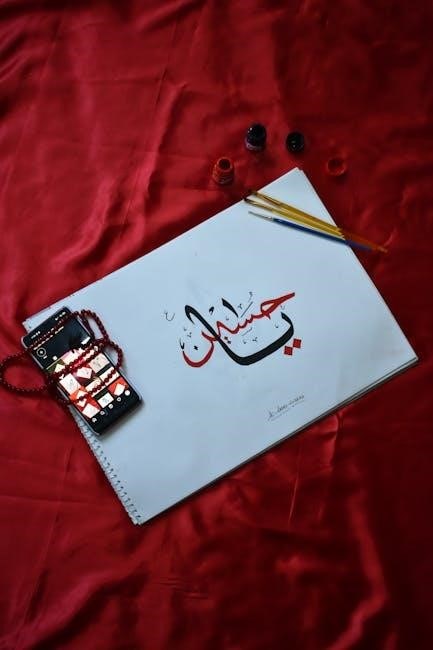Discover essential basic Arabic words and phrases for beginners, covering greetings, numbers, and common expressions. Explore PDF resources for a comprehensive learning experience.
Importance of Learning Arabic
Learning Arabic unlocks access to a rich cultural heritage and fosters global communication. As the 6th most spoken language, Arabic connects over 200 million speakers worldwide. It enhances career opportunities, deepens understanding of Middle Eastern history, and enriches personal growth. Mastery of Arabic opens doors to diverse literature, media, and intellectual traditions, making it a valuable skill in today’s interconnected world.
Overview of Arabic Language Structure
The Arabic language is characterized by its unique script and complex grammar. It is written from right to left, with 28 letters in its alphabet. Arabic grammar includes gendered nouns, verb conjugations, and a system of prefixes and suffixes. The language is known for its richness in vocabulary, with over 12 million words, making it highly expressive. This structure forms the foundation for learning basic Arabic words and phrases effectively.

Common Arabic Phrases for Everyday Communication
Mastering basic Arabic phrases is key to effective communication. Learn essential greetings like “Marhaba” (Hello) and “Ma’a as-salama” (Goodbye). Phrases like “Shukran” (Thank you) and “Afwan” (You’re welcome) are widely used. Discover how to ask questions politely and express common needs, helping you navigate daily interactions with confidence in Arabic-speaking communities.
Mastering basic Arabic greetings is essential for polite communication. Common phrases include Marhaba (Hello), Sabah al-khayr (Good morning), and Ma’a as-salama (Goodbye). Introduce yourself with Ismaa bee (My name is) or Ana (I am). Express respect with As-salamu alaykum (Peace be upon you), often replied with Wa alaykum as-salam. These phrases are widely used and will help you make a positive impression in Arabic-speaking cultures.
Basic Questions and Directions
Learn essential questions and directions in Arabic to navigate daily situations. Common phrases include Ma ismuka? (What is your name?) and Ma hiya al-sa’a? (What time is it?). Ask for directions with Wayn al-mustashfa? (Where is the hospital?) or Kayfa adhhab ila al-mataar? (How do I get to the airport?). These expressions will help you communicate effectively and find your way in Arabic-speaking environments.

Essential Vocabulary for Beginners
Master basic Arabic words for numbers, days, and common items like kitab (book) and madrasa (school). These PDF guides provide foundational vocabulary for effective communication.
Numbers and Days of the Week
Learn basic Arabic numbers like واحد (one) and اثنان (two), and days of the week such as الاثنين (Monday) and السبت (Saturday). These PDF guides provide clear translations and pronunciation tips, helping beginners grasp essential vocabulary for daily communication and foundational language skills.
Family and Relationships
Master Arabic words for family members like أب (father) and أم (mother), and relationships such as أخ (brother) and أخت (sister). PDF guides offer translations and pronunciation aids, making it easy for beginners to communicate about their families and build connections in Arabic-speaking contexts effectively.

Food and Drink Vocabulary
Explore essential Arabic food and drink words, such as ماء (water) and خبز (bread). PDF guides offer translations and pronunciation, helping beginners learn culinary terms easily.
Common Food Items
Learn essential Arabic food words like خبز (bread), ماء (water), and طعام (food). Discover terms for (meat), خضار (vegetables), and ثريد (a traditional dish). PDF guides provide translations and pronunciation, helping beginners master culinary vocabulary for everyday conversations and cultural understanding.
Drinks and Meals
Explore common Arabic terms for drinks like شاي (tea) and قهوة (coffee), and meals such as فطور (breakfast) and غداء (lunch). Learn words for water (ماء) and juice (عصير). These PDF resources offer translations and pronunciation guides, helping beginners navigate mealtime conversations and cultural dining experiences with confidence and ease.
Arabic Greetings and Polite Expressions
Master essential Arabic greetings like مرحبا (hello) and صباح الخير (good morning). Learn polite expressions such as شكرا (thank you) and عذرًا (excuse me) for respectful communication in Arabic-speaking cultures.
Formal and Informal Greetings
Learn formal Arabic greetings like مرحبا (hello) and صباح الخير (good morning). For informal settings, use (hi) or كيف الحال (how are you). Mastering these greetings helps in respectful and clear communication in Arabic-speaking cultures, making interactions smoother and more meaningful.
Expressions of Gratitude and Courtesy
Learn essential Arabic expressions like شكرا (thank you) and (informal thanks). Use (please) and (you’re welcome) for politeness. Mastering these phrases enhances communication and shows respect in Arabic culture, making interactions more harmonious and meaningful. These expressions are vital for building rapport and demonstrating courtesy in daily conversations.

Learning the Arabic Alphabet
Master the Arabic alphabet with free PDF guides, offering step-by-step lessons for beginners to learn letters, pronunciation, and basic script.
The Arabic script is a beautiful, cursive writing system read right-to-left. It consists of 28 letters, each with distinct forms depending on position. Beginners can learn through PDF guides offering pronunciation tips and practice exercises. Understanding the script is key to mastering basic Arabic words and phrases, enabling learners to explore the language’s rich cultural and literary heritage effectively.
Pronunciation Guide for Beginners
Mastering Arabic pronunciation starts with understanding its unique sounds. Many letters have no direct English equivalents, making practice essential. PDF guides often include phonetic transliterations and audio aids to help learners. Focus on correct intonation and stress patterns, as these significantly impact meaning. Regular practice with pronunciation exercises in these resources will build confidence and clarity in speaking basic Arabic words effectively.
Asking Questions in Arabic
Learn to form simple questions using common question words like “what,” “where,” and “how.” PDF guides provide phrases for everyday situations, helping beginners communicate effectively.
Common Question Words
Master essential question words in Arabic, such as “who” (مَنْ ― man), “what” (مَا — mā), “when” (مَتَى ― matā), “where” (أَيْنَ ― ayna), “why” (لِمَاذَا — limādhā), and “how” (كَيْفَ — kayfa). These words are vital for forming questions in Arabic. PDF guides offer examples and exercises to help beginners practice these phrases effectively in daily conversations.
How to Form Simple Questions
Forming simple questions in Arabic involves using question words like “مَنْ” (who) or “مَا” (what) at the beginning. Add “هَلْ” for yes/no questions, e.g., “هل أنتَ طالبٌ؟” (Are you a student?). Use “أَيْنَ” for location and “مَتَى” for time. PDF guides provide exercises to practice these structures, helping beginners construct clear and grammatically correct questions in Arabic.
Common Expressions for Daily Situations
Master essential Arabic expressions for daily interactions, such as greetings, apologies, and gratitude. Phrases like “كيف الحال؟” (How are you?) and “السلام عليكم” (Peace be upon you) are vital for communication.
Shopping and Money
Learn essential Arabic phrases for shopping, such as “كم ثمن هذا؟” (How much is this?) and “أحتاج هذا” (I need this). Understand basic money-related terms like numbers and pricing to navigate markets confidently. These phrases simplify interactions with sellers and help manage transactions effectively. Mastering these expressions enhances your ability to shop and handle financial matters in Arabic-speaking environments with ease and clarity.
Time and Schedules
Master Arabic phrases for time and schedules, such as “الساعة كم؟” (What’s the time?) and “اليوم هو أيام الأسبوع؟” (What day is today?). Learn to express time intervals, like “في الصباح” (in the morning) and “في المساء” (in the evening). These expressions help you manage daily routines, appointments, and plans effectively in Arabic-speaking contexts. Essential for coordinating schedules and understanding timelines with clarity.
Household Items and Furniture
Learn essential Arabic words for household items and furniture, such as house (تϵب), book (كتاب), table (طاولة), and chair (كرسي). These basics help in describing your surroundings effectively.
Names of Rooms and Objects
Learn the Arabic names for common rooms and objects, such as house (تϵب), school (مدرسة), and hospital (مستشفى). Essential objects include book (كتاب), table (طاولة), and chair (كرسي). These words help beginners identify and describe their surroundings effectively. Mastering these terms is crucial for building a strong foundation in Arabic vocabulary and communication skills.
Describing Your Surroundings
Expand your vocabulary with words that describe your environment. Learn terms like home (), school (), and park (). Common objects such as chair (), table (), and book () are essential. Use descriptive words like big () and small () to convey size. These phrases help you communicate effectively about your daily surroundings and needs.

Travel and Transportation Vocabulary
Master essential words for directions, transportation, and travel. Learn phrases like airport, hotel, ticket, and map to navigate confidently in Arabic-speaking environments.
Directions and Transportation
Learn essential Arabic words for navigating directions and transportation. Key terms include left (شمال / shmaal), right (يمين / yameen), and straight (إلى الأمام / ila al-amam). Transportation-related phrases like bus (حافلة / haafila), taxi (تاكسي / taaksi), and train (قطار / qihaar) are vital. Discover how to ask for directions with phrases like “Where is the nearest…?” (أين أقرب…؟ / ayn aqarb…) and “How do I get to…?” (كيف أصل إلى…؟ / kayfa aslu ila…?). These phrases are often included in PDF guides for beginners, making navigation easier in Arabic-speaking countries.
Hotel and Airport Phrases
Master Arabic phrases for hotels and airports, such as “Do you have any rooms available?” (هل هناك غرف متوفرة؟ / hal hunaka ghuraf mutawaffira?) and “I have a reservation” (لدي حجز / laday hafla). Learn terms like check-in (التسجيل الدخول / altasjil aldukhool), check-out (التسجيل الخروج / altasjil alkhoruj), and passport (جواز السفر / jawaaz alsafar). Airport phrases include “Where is the baggage claim?” (أين находится багажная? / ayn albaghaj?) and “What is the gate number?” (ما رقم البوابة؟ / ma raqm albawwaba?). These phrases are often included in PDF guides to help beginners navigate smoothly.

Cultural Tips for Learning Arabic
Understanding cultural nuances is key to mastering Arabic. Respect for traditions and polite expressions enhances learning. Practice greetings and common courtesies to connect deeply with native speakers.
Cultural Context in Language Learning
Learning Arabic is deeply rooted in understanding its cultural context. Respect for traditions, polite expressions, and regional dialects enriches your language journey. While Modern Standard Arabic is widely understood, dialects vary across regions. Embrace cultural nuances, such as greetings and hospitality, to communicate effectively. Non-verbal cues and shared values also play a significant role in meaningful interactions. Cultural awareness enhances your ability to connect authentically with Arabic speakers.
Practical Tips for Beginners
Start with the Arabic alphabet and practice pronunciation daily. Use visual aids like flashcards for vocabulary retention. Focus on common phrases for everyday interactions. Prioritize consistent practice, even for short periods. Leverage free PDF resources for structured learning. Engage with native speakers or online communities to refine your skills. Regular review of basic words and phrases ensures steady progress in your Arabic learning journey.

Free PDF Resources for Learning Arabic
Download free Arabic PDF guides offering comprehensive lessons on alphabet, grammar, and vocabulary. These resources provide structured learning for beginners, covering essential phrases and daily conversations with ease.
Recommended PDF Guides for Beginners
Start your Arabic journey with free PDF guides designed for beginners. These resources include comprehensive vocabulary lists, pronunciation tips, and essential phrases. Download guides like “Basic Arabic Words” and “Arabic Vocabulary for Beginners” to learn common expressions, greetings, and numbers. Many PDFs also cover cultural tips and daily conversations, ensuring a well-rounded learning experience; These materials are easily accessible and perfect for self-study.
Where to Download Free Arabic Learning Materials
Access free Arabic learning materials from reliable platforms like ArabicPod101, selfarabic.com, and pdf-language-lessons.com. These websites offer downloadable PDF guides packed with basic Arabic vocabulary, grammar, and phrases. You can also find resources on platforms like Google Drive and scribd.com, providing comprehensive learning tools for beginners. These materials are designed to make learning Arabic easy and accessible for everyone.



